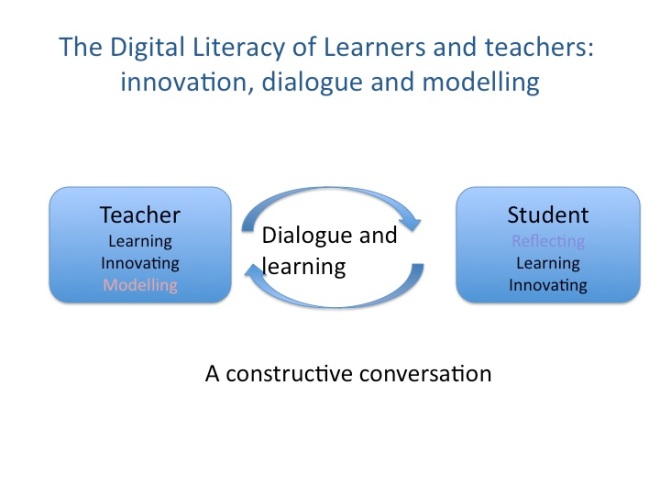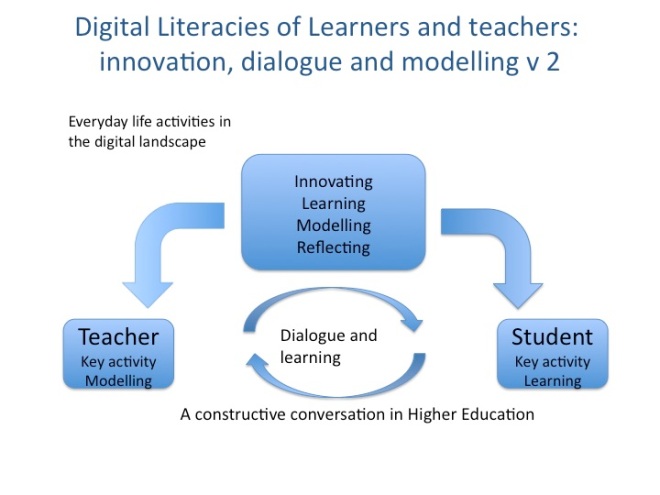
CCL Kevin Spencer at http://www.flickr.com/photos/vek/4997286231/
The issue of jargon came up at the JISC online conference more than once today. This was my first involvement at the conference, and I was asked to contribute to 2 sessions on digital literacies. Despite many other commitments and a stinking cold, I enjoyed both sessions that seemed to generate a rich discussion amongst participants (as it was a closed conference, I can’t share the recordings or discussion links with you).
Of course, my view of the sessions was not universal;) It became clear that some participants found the terminology being used inexact and alienating (smiling as I realise this term may be deemed to be jargon). One particular issue was around the terms (digital) competency and digital literacy(ies). In my job as facilitator, I picked up a reference to this from the Elluminate session chat and fed it back as part of a reply. This thread developed and highlighted that competence and literacy are terms used in very different ways in different communities. Some participants from FE (for non-UK non-education folk that means Further Education, tertiary education, vision outlined here) found the use the terms ‘literacy’ and ‘competence’ as being completely different to how they are used in FE sector. At the Friday session, I was ticked off in the chat for using the term ‘user’ as it has connotations of drug user.
So why does any of this matter? If we come together at conferences, in order to share ideas about ( in this case) innovating in e-learning, then real dialogue has to take place if we are to achieve this.
I am using the term ‘dialogue’ in the sense that David Bohm used it – briefly, to share and create meaning through words rather than to argue and debate our own ‘truths’, short explanation here, entire book here
It is clear that different vocabularies (particularly when terms are used in contradictory ways) can be obstacles to dialogue but I sense that some of the complaints about jargon are pointing to wider frustration about communication processes. As Paul Becque says ” Bohm may have suggested that we are often talking about the same important things but get psychologically trapped in attacking and defending how we define and articulate these things.” I wonder if we were all talking about the same things but the process was somehow faulty at times. I am pleased that the exchange caused me to think about my own communication (I was supposed to be a facilitator after all), and I’d like to offer the space of this blog post, if anyone wants to share their thoughts. Who knows? we may create some shared meanings.
And now I think it’s important that we iterate multidisciplinary paradigms – just kidding;) I got that from plugging ‘digital literacy’ into http://www.sciencegeek.net/lingo.html. Here are some of my thoughts about communication with respect to ‘digital literacies’ – whatever that means.
Yesterday’s exchange me to think about why I use the term ‘digital literacy’. I was definitely using it in 2009, and think that I adopted the term to cover work that I was already doing in curriculum development, based on my beliefs in the need for experiential learning of new technologies, and the value of such learning activities in providing opportunities for critical reflection (studded with my then educational jargon). Adopting the term led me into writings and communities that resonated with me and helped me to develop my thinking and educational practice. I know that I would not have used the term ‘computer literacy’ as for me, that had negative connotations from my own children’s experiences at school and college in the 1990/2000s.
I re-read my recent blog post on digital literacies as constructive dialogue and realised that although I use the term Digital Literacies in the title of the model, I don’t use it within the model, nor is it a term I would use with students. I wonder what jargon I use with them – ‘digital media landscape’ is a contender.
My last thought is about the feasibility of a common agreed vocabulary – I don’t think that is feasible or even (probably) desirable). Different communities do use different vocabularies, and when they get together for a project, they might usefully agree a glossary of terms for the project but vocabulary standardisation would be just too controversial and too much effort, I think. In 2007, Stephen Downes posted on Why The Semantic Web will fail and I suspect that there more reasons than he identifies.
I would love to hear what you think, particularly anyone who was at #jiscel11.




